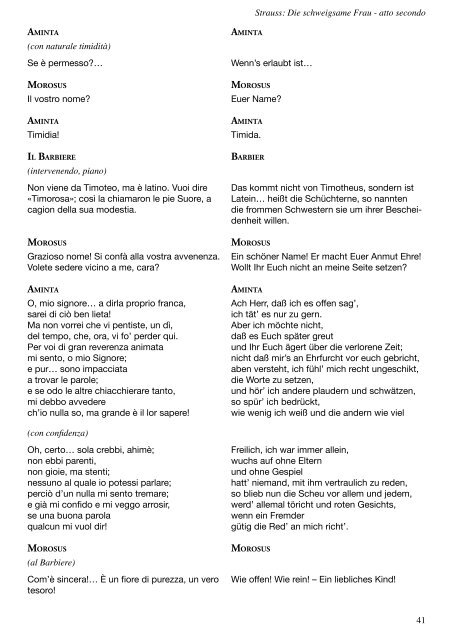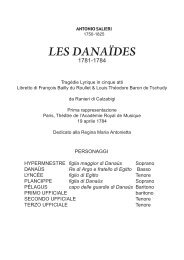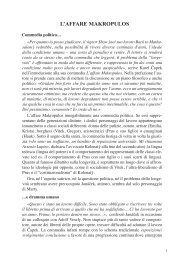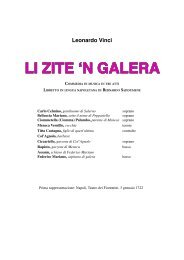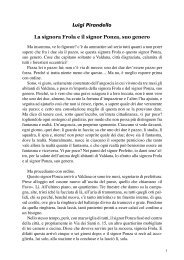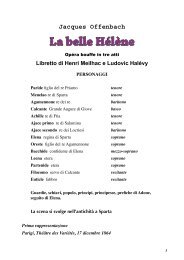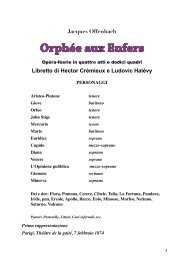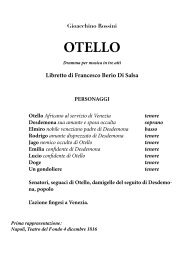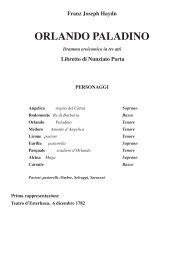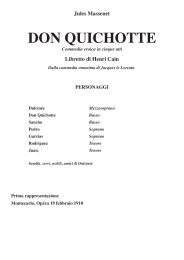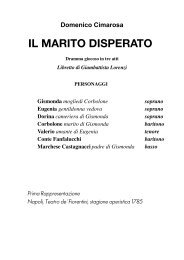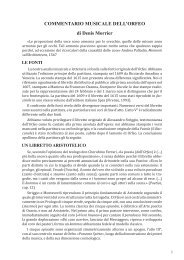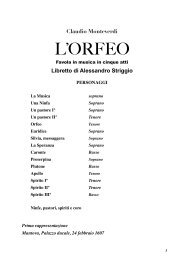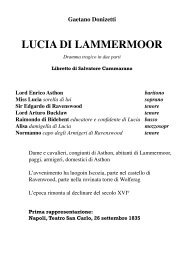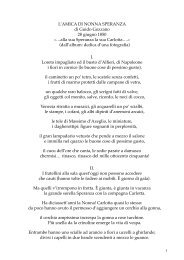La donna silenziosa lib bil.indd - benvenuto a «di cose un po
La donna silenziosa lib bil.indd - benvenuto a «di cose un po
La donna silenziosa lib bil.indd - benvenuto a «di cose un po
You also want an ePaper? Increase the reach of your titles
YUMPU automatically turns print PDFs into web optimized ePapers that Google loves.
Strauss: Die schweigsame Frau - atto secondo<br />
AMINTA<br />
(con naturale timidità)<br />
Se è permesso?…<br />
MOROSUS<br />
Il vostro nome?<br />
AMINTA<br />
Timidia!<br />
IL BARBIERE<br />
(intervenendo, piano)<br />
Non viene da Timoteo, ma è latino. Vuoi dire<br />
«Timorosa»; così la chiamaron le pie Suore, a<br />
cagion della sua modestia.<br />
MOROSUS<br />
Grazioso nome! Si confà alla vostra avvenenza.<br />
Volete sedere vicino a me, cara?<br />
AMINTA<br />
O, mio signore… a dirla proprio franca,<br />
sarei di ciò ben lieta!<br />
Ma non vorrei che vi pentiste, <strong>un</strong> dì,<br />
del tem<strong>po</strong>, che, ora, vi fo’ perder qui.<br />
Per voi di gran reverenza animata<br />
mi sento, o mio Signore;<br />
e pur… sono impacciata<br />
a trovar le parole;<br />
e se odo le altre chiacchierare tanto,<br />
mi debbo avvedere<br />
ch’io nulla so, ma grande è il lor sapere!<br />
AMINTA<br />
Wenn’s erlaubt ist…<br />
MOROSUS<br />
Euer Name?<br />
AMINTA<br />
Timida.<br />
BARBIER<br />
Das kommt nicht von Timotheus, sondern ist<br />
<strong>La</strong>tein… heißt die Schüchterne, so nannten<br />
die frommen Schwestern sie um ihrer Bescheidenheit<br />
willen.<br />
MOROSUS<br />
Ein schöner Name! Er macht Euer Anmut Ehre!<br />
Wollt Ihr Euch nicht an meine Seite setzen?<br />
AMINTA<br />
Ach Herr, daß ich es offen sag’,<br />
ich tät’ es nur zu gern.<br />
Aber ich möchte nicht,<br />
daß es Euch später greut<br />
<strong>un</strong>d Ihr Euch ägert über die verlorene Zeit;<br />
nicht daß mir’s an Ehrfurcht vor euch gebricht,<br />
aben versteht, ich fühl’ mich recht <strong>un</strong>geschikt,<br />
die Worte zu setzen,<br />
<strong>un</strong>d hör’ ich andere plaudern <strong>un</strong>d schwätzen,<br />
so spür’ ich bedrückt,<br />
wie wenig ich weiß <strong>un</strong>d die andern wie viel<br />
(con confidenza)<br />
Oh, certo… sola crebbi, ahimè;<br />
non ebbi parenti,<br />
non gioie, ma stenti;<br />
ness<strong>un</strong>o al quale io <strong>po</strong>tessi parlare;<br />
perciò d’<strong>un</strong> nulla mi sento tremare;<br />
e già mi confido e mi veggo arrosir,<br />
se <strong>un</strong>a buona parola<br />
qualc<strong>un</strong> mi vuol dir!<br />
MOROSUS<br />
(al Barbiere)<br />
Com’è sincera!… È <strong>un</strong> fiore di purezza, <strong>un</strong> vero<br />
tesoro!<br />
Freilich, ich war immer allein,<br />
wuchs auf ohne Eltern<br />
<strong>un</strong>d ohne Gespiel<br />
hatt’ niemand, mit ihm vertraulich zu reden,<br />
so blieb n<strong>un</strong> die Scheu vor allem <strong>un</strong>d jedem,<br />
werd’ allemal töricht <strong>un</strong>d roten Gesichts,<br />
wenn ein Fremder<br />
gütig die Red’ an mich richt’.<br />
MOROSUS<br />
Wie offen! Wie rein! – Ein liebliches Kind!<br />
41


